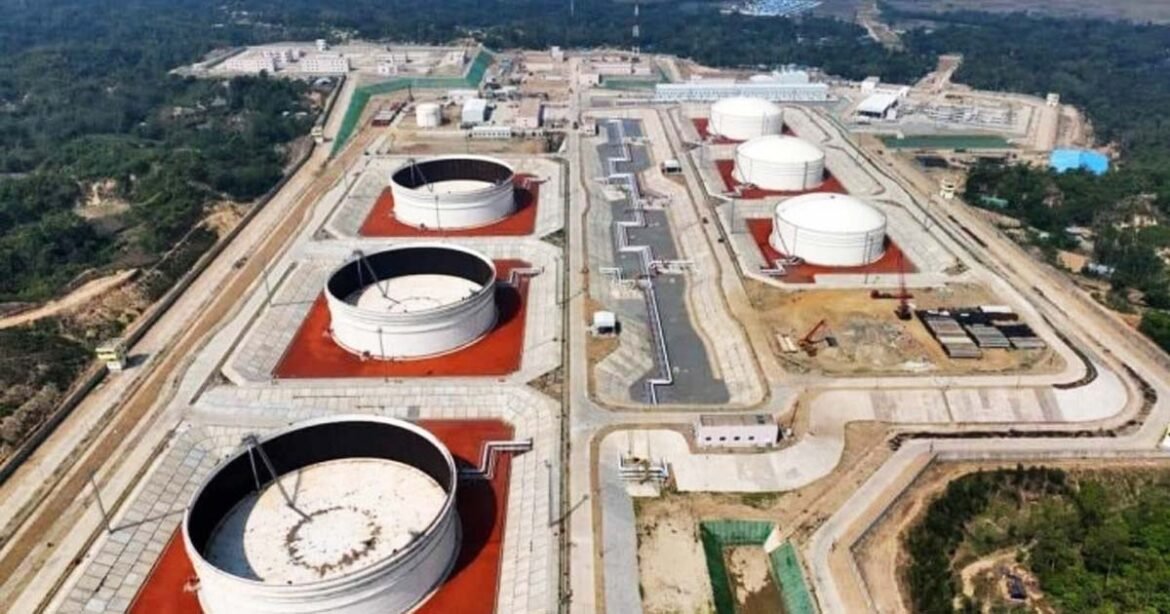On Sunday, July 2, 2023, Bangladesh embarked on a new phase of imported oil transportation, utilising pipelines for the transfer of crude oil from the deep sea to the refinery. This development was initiated through a test run of the Single Point Mooring project, currently under construction in Cox’s Bazar Moheshkhali.
You can also read: Govt. initiates cost-cutting measures to tackle financial constraints
According to officials, the trial commenced seven days after the arrival of a sizable vessel named “MT Horae” from Saudi Arabia, which carried approximately 82,000 tonnes of crude oil in the Bay of Bengal.
Crude oil deficiencies to be met soon
According to the Bangladesh Petroleum Corporation, the country currently has an oil reserve capacity of two and a quarter months. With the implementation of the Single Point Mooring project, the capacity will be extended by an additional 15 days, thanks to the storage capacity of onshore reserve tanks and pipelines, amounting to 20,000 tonnes.
As per the Energy and Mineral Resources Division, the state-run Eastern Refinery currently has a refining capacity of 1.5 million tonnes of crude oil per year. The project will increase its capacity to 4.5 million tonnes.
“The MT Horae is the largest ship in the history of Bangladesh. The crude oil, weighing 82,000 tonnes, is being piped from the deep sea to Patenga. This has never been done before in the country,” added Rear Admiral M Sohail, Chairman of the Chattogram Port Authority, which is collaborating with the authorities of the Single Point Mooring project – Bangladesh Petroleum Corporation – for the test run.
He further highlighted that the project will bring about significant changes in the transportation and distribution of imported petroleum products.
The Single Point Mooring project, initiated in 2015, was initially scheduled for completion on June 30. Due to delays in the completion of work and certain changes, it received a one-year extension, with the estimated costs increased from Tk5,500 crore to Tk8,341 crore, an increment of Tk1,217 crore. The majority of the financing is being provided by the Exim Bank of China, while the government and the Bangladesh Petroleum Corporation are covering the remaining costs.
All about the pipeline infrastructure
Traditionally, Bangladesh has relied on lighter vessels to transfer imported crude oil from larger vessels to refineries, a process that typically takes around 12 days and incurs additional freight charges. According to Sharif Hasnat, Director of the Single Point Mooring project, the implementation of the pipeline infrastructure will lead to a substantial reduction in transfer time, bringing it down to only three days. This improvement will result in significant cost savings.
Under the project, a total of 220 km of pipelines have been installed, with 146 km located offshore and 74 km onshore. The offshore pipelines will transport the petroleum oil from the mother vessel to a shore tank in the Kalamarchara area of Moheshkhali, while the onshore pipelines will further carry it to the state-run Eastern Refinery in Patenga, Chattogram.
The Tk8,341-crore Single Point Mooring project is anticipated to save approximately Tk800 crore annually by reducing the time and costs associated with imported oil transportation. If the test run proves successful, Prime Minister Sheikh Hasina is expected to inaugurate the project in August, as mentioned by Sharif Hasnat.


